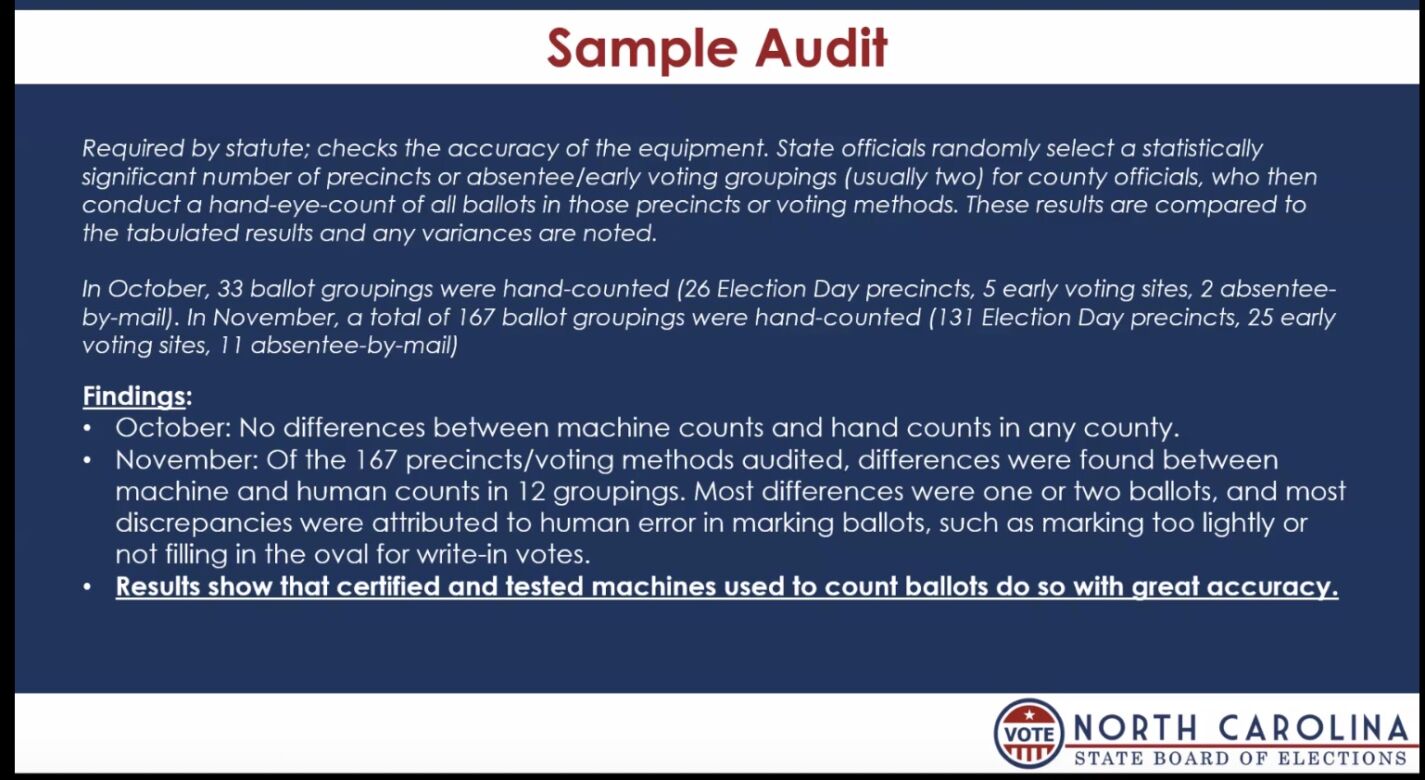The North Carolina State Board of Elections met Tuesday to certify the municipal elections from October and November, and to set temporary rules for 2024 election observers. The new rules were laid out in Senate Bill 747 Election Law Changes which state lawmakers passed in the fall overriding a veto from Gov. Roy Cooper.
In Tuesday’s meeting, NCSBE Executive Director Karen Brinson Bell reported that municipal elections held on Oct. 10 and Nov. 7 ran pretty smoothly. The county boards, she said, go through a process of canvas where they make sure that everything has been correctly tabulated before they authenticate and send up their results to the state board to conduct their canvas.
Fifteen counties’ voter histories and ballots cast matched exactly in the October elections, with the remaining five having minor differences of one or two ballots, which does not affect the election outcome.
In November, 54 out of 86 counties had perfect matches, with the remaining 32 having minor differences, most by just a single ballot, again, not affecting the outcome of the election.
The sample audit, required by law and performed by the state board since 2006, had similar results. It requires the state board to randomly select two groupings, like early voting or absentee by mail, with a statistically significant number of precincts for counting by hand.
No differences were found for October, and 12 differences were found in November’s elections, meaning one or two ballots may have been off, which is not uncommon.
Brinson Bell said the sample audit showed that the machines did tabulate and count the ballots accurately in the elections.

It was also noted that several ties in the November election had to be decided with a flip of a coin or drawing a name from a hat, which stressed the importance of voting in municipal elections.
The board unanimously approved certifying the votes cast for the Nov. 7 election.
date for distribution of absentee ballots pushed
They also unanimously voted to move the absentee ballot distribution date for the March 5, 2024 primary election from Monday, Jan. 15, to Friday, Jan. 19, 2024.
Under state law, county boards are required to begin mailing out absentee ballots for a primary election 50 days before election day. But, since the 50-day deadline falls on Jan. 15, Martin Luther King Jr. Day, a federally recognized holiday, county board offices and post offices will be closed. The deadline would then be moved up three days earlier to Friday, Jan. 12.
NCSBE decided to push back the date to Jan. 19 because candidate filing does not end until Dec. 15. This will give the state board and county boards of elections more time to ensure that all ballots are generated, proofed, printed, and delivered to their offices for the primary.
The state board has the discretion to move the date to begin distributing absentee ballots to 45 days before Election Day, matching the deadline by which states are required to begin distributing absentee ballots to military and overseas citizens under the federal Uniformed and Overseas Citizens Absentee Voting Act (UOCAVA).
The Board noted that this is only a temporary change for this election cycle due to the dates of candidate filing and the holidays and will not become permanent.
new rules for election observers
Three temporary rules for election observers were also discussed during the meeting. New Election Law Changes (SB747), went into effect last month and replaces the current observer statute.
NCSBE counsel Paul Cox said the new rules are temporary because there wasn’t enough time to complete the permanent rule-making process before Feb. 15, the start of early voting for the March 2024 primary.
The first rule is setting the process for challenges to appointed observers. For example, the chief judge of a voting site or the county board itself can challenge the appointment of an observer for a good cause. Additionally, the statute requires the state board to provide a process to handle appeals of those challenged decisions. So, if a chief judge decides not to accept an observer at the voting site, then there will be a process for an appeal.
The second rule sets the appeal process on removing a poll observer from a polling site for misconduct. The statute addresses having the appeal but not the process.
The third rule requires observers to have an ID badge that will display political party affiliation and whether they are appointed by a candidate.
The Board unanimously voted to have the public comment period for the proposed temporary rules take place between Nov. 29 and Dec 19, with a public hearing on Dec. 14 at 11 AM.
They also voted unanimously on a resolution for county boards to set the date for appointing early voting officials. The change was also due to S.B. 747. The statute requires county boards to appoint poll workers to early voting in a similar way that the county board appoints election day poll workers.
NC voter registration form doesn’t comply with federal law
The Board also discussed a complaint filed by Carol Snow, which stated that the state’s voter registration form violated the Help America Vote Act (HAVA). She said it does not comply with requirements that a voter put their driver’s license number or the last four digits of their Social Security number on the voter registration form.
Officials said they were already in the process of revamping the voter registration form, and this was one of the items they were looking at because there was an inconsistency between the way the HAVA ID question is presented to voters and the way that the federal statute reads.
They unanimously agreed that the form violated Section 303 of HAVA and would implement changes already being discussed to the form. However, they rejected Snow’s second request to contact voters to get their identifying information.